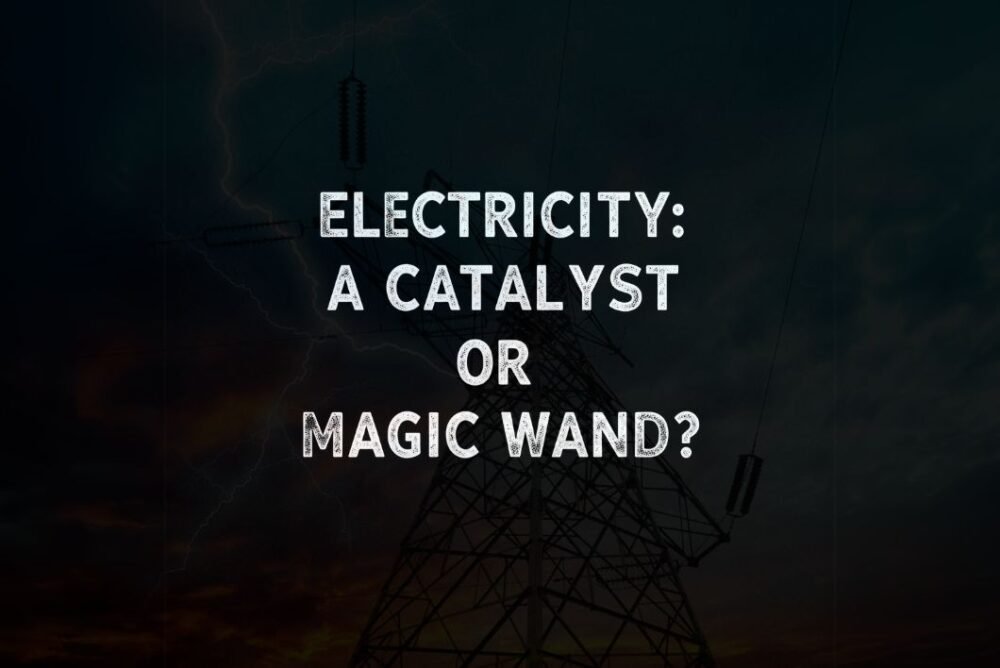“It Wasn’t God Who Made Honky Tonk Angels” by Dolly Parton – that was the song playing in my ears through my phone when I stumbled upon the tweet from a Twitter (X) user who believes that the lack of 24/7 electricity is merely an excuse for Nigeria’s unproductivity. The song, known for challenging one-sided narratives about infidelity, seemed oddly fitting for what I was about to read. According to them, even with a stable power supply, the country would not be any more productive than it is today – a strong claim to make.
Electricity is often considered the lifeblood of modern civilisation and a precursor to development. I subscribe to this school of thought as I believe electricity availabilility and access ties closely to a nation’s productivity, in essence, GDP. But belief alone isn’t enough, we must examine the facts.
If we analyse the world’s top 10 economies based on GDP per capita and compare their electricity production and access with the bottom 10, a clear pattern emerges: the more stable the electricity supply, the more productive the economy tends to be. The correlation is undeniable, electricity supports industrial output, service sectors, and even digital economies. However, as with all economic principles, there are black swans – outliers that challenge conventional wisdom.
Another Twitter (X) user pointed this out while attempting to counter the argument that electricity is a prerequisite for productivity by comparing Egypt, South Africa, and Nigeria. In 2014, Egypt boasted nearly 100% electricity coverage, South Africa around 86%, and Nigeria less than 60%. Logically, one would expect Egypt to be the most productive of the three nations. However, GDP per capita – a key indicator of economic output per person – painted a different picture. The period of analysis showed that Egypt’s GDP per capita was lower than South Africa’s and Nigeria’s, despite its citizens having better electricity access.
At first glance, this comparison might seem like a compelling argument against the notion that electricity is a magic wand for productivity. But context is everything. The time frame used for the analysis coincided with the Arab spring, a period when Egypt was grappling with instability linked to the Muslim Brotherhood, which severely disrupted the economy and governance. This highlights a crucial point: electricity is not the only determinant of economic growth. Other factors, such as political stability, governance, and macroeconomic policies, play critical roles in shaping a nation’s productivity.
To get a clearer picture, let’s take a more recent look at the GDP per capita and electricity access levels of South Africa, Egypt, and Nigeria.
One thing stands out: Nigeria’s electricity production has remained stagnant since 2014. And logically, over the same period, GDP per capita has declined, and other economic indicators have worsened. What changed? Key factors such as foreign exchange fluctuations, double-digit inflation, governance failures, declining education quality, and rising corruption have compounded Nigeria’s economic woes. These issues have stifled productivity, proving that electricity alone isn’t the problem. However, dismissing electricity as a non-factor is equally flawed. It is one of several foundational elements required for economic progress. Without reliable power, businesses struggle, industries remain underdeveloped, and innovation is stifled as in Nigeria’s case since 2014.
On the other hand, the question – whether Nigerians can afford 24/7 electricity is valid – because it makes no sense to produce electricity when there isn’t a ready market. Interestingly, outside urban areas, like the state capitals and major economic hubs, electricity demand is relatively low, making the idea of nationwide, uninterrupted power supply seemingly unrealistic. Notwithstanding, access to electricity should be a basic human right – and it must be made available to all.
Given Nigeria’s economic structure, a more realistic approach to making electricity available and accessible to rural population would be cross-subsidisation, where urban electricity consumers pay a higher tariff, and part of it offsets the electricity costs in rural areas – similar to models adopted in India, China, and Brazil. While it can be an effective short-term solution for increasing rural electricity access, its long-term financial and operational sustainability is questionable due to the subsidy burden and our penchant for corruption. Alternatively, drawing from one of my MBA projects, decentralised renewable energy (DRE) solutions (such as off-grid or mini-grid solar, wind, or hydroelectric power) combined with Pay-As-You-Go and microfinancing models, could increase electricity access in local communities, as seen in Kenya.
Moreover, a well-thought-out strategy is needed to stimulate electricity consumption in local communities – where, in many cases, it is used for little more than phone charging – whether through lifestyle changes or economic incentives. Unfortunately, Nigeria is notorious for misplaced priorities and a lack of strategic planning, both at governmental and individual levels. There is little alignment between resources and needs. That’s why a town known for heavy manufacturing lacks railway access to markets that need its products. A farming village producing perishable goods has no good roads to connect it to factories that require agro raw materials. An industrial cluster with high power needs operates without reliable electricity. These are not isolated incidents but symptoms of a broader structural failure.
In my line of work, I have seen firsthand how this inefficiency affects real businesses and livelihoods. I recall an NGO-backed company that established a rice milling plant in Doma, Nasarawa State, a perfect location given the area’s expansive rice farming culture. Yet, the plant couldn’t function because the location lacked electricity due to the absence of a transformer. The mill manager had to source millions of naira to procure one before production could begin. This is the everyday reality of doing business in Nigeria, ergo being productive – potential is abundant, but execution is crippled by a lack of basic infrastructure.
This frustration is the bedrock of my grouse with the original Twitter (X) user’s argument was its framing, which brings me back to the Dolly Parton song: just as the song challenges a one-sided view of infidelity, so too must I challenge simplistic economic arguments. The framing effect – the way information is presented – can significantly influence perception. In marketing, we understand this well.
The issue isn’t just about whether electricity alone can drive productivity; it’s about acknowledging that while electricity isn’t a magic wand, its absence creates a fundamental barrier to economic growth, and rather than addressing the root problem, the blame is often shifted onto the people who are simply forced to live in – and love darkness.
Dismissing electricity access as insignificant is as flawed as assuming it is the only factor that matters. It is neither a magic wand nor a trivial issue. It is a fundamental necessity that enables economic growth. Countries that invest in stable electricity infrastructure tend to have stronger economies, but they also implement complementary policies that drive development. Nigeria’s challenge isn’t just electricity; it’s the failure to address multiple interlinked problems, from governance and infrastructure to economic incentives and strategic planning.
So, at this point, is electricity a magic solution to Nigeria’s economic problems? No. But is it a necessary foundation for productivity? Absolutely.
The reality is that economic productivity is driven by a combination of factors. Electricity is one of them, but without addressing systemic inefficiencies, Nigeria will remain trapped in a cycle of underdevelopment. The key is to take a holistic approach, one that recognises electricity as a catalyst, not as an isolated solution. Compelling that Nigeria shifts from short-term, reactionary policies to long-term, strategic planning. Only then can we begin to break-free from the constraints of underdevelopment.





